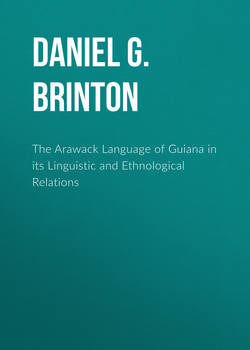Читать книгу The Arawack Language of Guiana in its Linguistic and Ethnological Relations - Daniel G. (Daniel Garrison) Brinton - Страница 5
PRONOUNS
ОглавлениеThe demonstrative and possessive personal pronouns are alike in form, and, as in other American languages, are intimately incorporated with the words with which they are construed. A single letter is the root of each: d I, mine, b thou, thine, l he, his, t she, her, it, its, w we, our, h you, your, n they, their; to these radical letters the indefinite pronoun ükküahü, somebody, is added, and by abbreviation the following forms are obtained, which are those usually current:
dakia, dai, I.
bokkia, bui, thou.
likia, he.
turreha, she, it.
wakia, wai, we.
hukia, hui, you.
nakia, nai, they.
Except the third person, singular, they are of both genders. In speaking, the abbreviated form is used, except where for emphasis the longer is chosen.
In composition they usually retain their first vowel, but this is entirely a question of euphony. The methods of their employment with nouns will be seen in the following examples:
üssiquahü, a house.
dássiqua, my house.
bússiqua, thy house.
lüssiqua, his house.
tüssiqua, her, its house.
wássiqua, our house.
hüssiqua, your house.
nássiqua, their house.
uju, mother.
daiju, my mother.
buju, thy mother.
luju, his mother.
tuju, her mother.
waijunattu, our mother.
hujuattu, your mother.
naijattu, their mother.
waijunuti, our mothers.
hujunuti, your mothers.
naijunuti, their mothers.
Many of these forms suffer elision in speaking. Itti father, datti my father, wattínatti our father, contracted to wattínti (watti rarely used).
When thus construed with pronouns, most nouns undergo some change of form, usually by adding an affix; báru an axe, dábarun my axe, iulí tobacco, dajulite my tobacco.
